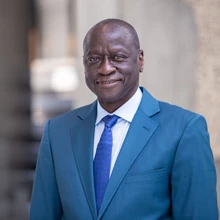
December 17, 2024 - This month, the World Bank’s shareholders assembled a record-breaking $100 billion financing package for the 21st replenishment of the International Development Association (IDA), the Bank’s fund for 78 low-income countries and by far their largest source of multilateral development finance. That money is vital in Sub Saharan Africa where poverty is more and more concentrated after a decade of stalled growth. A new report Leveling the Playing Field – Addressing Structural Inequalities to Accelerate Poverty Reduction in Africa offers a diagnostic of what has held back poverty reduction and directions to urgently correct course.
Simply put, past economic growth has been too low and too volatile but also too unequally distributed to lift people out of poverty on a significant scale. Africa is now the second most unequal region in the world after Latin America and hosts 60% of the world’s people living on less than $2.15 a day. The report describes the many ways in which structural inequality holds back growth and poverty reduction: children born into the poorest families are least likely to finish school on time and have the worst access to healthcare, electricity, sanitation and digital services. Their families are less likely to own land. And their initial handicaps are then compounded by laws and market distortions that favor certain workers and businesses over others. Tax and benefit policies also tend to aggravate their lack of cash in the short term.
At the end of the day, persistent structural inequality means poor people tend to stay poor despite their best efforts, because the odds are stacked against them. It doesn’t have to be this way. The report identifies four priorities for accelerating poverty reduction and realizing the dream of social mobility for African families and youth.
Four priorities to accelerate poverty reduction
- Build strong economic and institutional foundations: Countries must focus on building strong economic and institutional foundations, by promoting macroeconomic and fiscal stability and ensuring fair rules of the game. Eliminating barriers to competition, preventing undue privilege, and safeguarding property rights are steps that allow productive firms, farms, and workers to prosper.
- Broaden opportunities for human capital development: Expanding access to quality education, healthcare, and basic infrastructure is critical to increase productive capacity. Similarly, strengthening land registration and property rights, encouraging investments in natural capital, and improving service delivery will help maximize their potential.
- Make markets work better for people: Governments must enable markets to function better, so that existing productive capacities are better utilized by firms, farms, and people and generate better earnings for all workers. This means expanding access to capital and technology, domestic and regional markets, and global trade. It includes investments in roads and digital connectivity, as well as improved enforcement of competition laws, and better resources to facilitate job searches for workers.
- Adopt fair and efficient fiscal policies: By moving away from poorly targeted subsidies, strengthening social safety nets and promoting progressive taxation - including taxation of property – countries can ensure resources are directed toward those who need them the most.
Turning plans into action
These findings provide a blueprint for accelerated development that will require political will, effective implementation of policy reforms, and in some cases, like expanding access to electricity and education, significant monetary investments. In a region grappling with mounting debt and debt service costs, greater equity and efficiency in tax and spending policies will also be paramount.
Experience in the region shows that investing in change is worthwhile when reforms broaden opportunities for ordinary people. Countries can learn from peers like Ethiopia, where land rights expansion helped promote more investment in agriculture, or Kenya, where mobile money helped to boost financial inclusion, and Ghana, where investments in primary education led to increases in completion rates, while partial market liberalization of the cocoa sector, along with investment in research, disease control, and credit programs, led to increases in agricultural incomes.
At this pivotal moment, affordable and evidence-based international development assistance - such as the global knowledge and funding provided by IDA - will also be critical to invest in new foundations for growth that deliver lasting development wins for all. The World Bank is keen to support African countries every step of the way, whether it is by supporting broad economic governance reforms, driving a regional push, alongside the AfDB and other partners, to connect 300 million more people in Africa to electricity by 2030, ending learning poverty, or helping countries design and finance well targeted social protection programs that help poor families access nutritious food, send children to school, and grow their productive capacities.



Join the Conversation